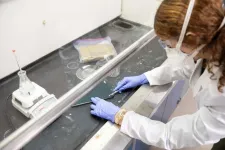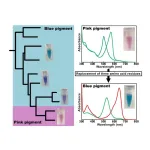(Press-News.org) Statement Highlights:
The latest research indicates that 16% to 85% of people recovering from a stroke experience at least one psychosocial symptom, including depression, anxiety, stress, fatigue and/or decreased quality of life.
Critical nursing interventions, such as regular mental health screenings, education, symptom management and follow-up care, are key to reducing the negative effects on a patient’s mental well-being after a stroke, yet only a small proportion of patients receive treatment.
More research is needed to develop stroke-specific mental health screening tools and evidence-based interventions to improve psychosocial health for stroke survivors.
Embargoed until 4 am CT/5 am ET Monday, August 19, 2024
DALLAS, August 19, 2024 — Nurses play a key role in helping patients manage emotional and social health challenges, or psychosocial health, after a stroke, and improved screening and assessment for psychosocial needs are essential to provide optimal patient care. These findings are highlighted in a new statement from the American Stroke Association, a division of the American Heart Association, titled “Nursing’s Role in Psychosocial Health Management After a Stroke Event,” published today in the Association’s peer-reviewed scientific journal Stroke.
While there have been significant advances in stroke prevention and treatment, stroke remains the second leading cause of death globally and a major cause of disability. The latest research indicates that 16% to 85% of stroke survivors experience psychosocial symptoms, such as depression, anxiety, stress, fatigue and/or a decreased quality of life during their recovery.
“Stigma often surrounds discussions about psychosocial health. Therefore, it is crucial for nurses and all health care professionals to create a safe and therapeutic environment for patients and offer hope and comprehensive education on the topic,” said Chair of the scientific statement’s writing group Patricia A. Zrelak, Ph.D., R.N., FAHA, a regional stroke program quality nurse consultant for Kaiser Permanente Northern California and a member of the American Heart Association’s Council on Cardiovascular and Stroke Nursing.
The scientific statement details a comprehensive review of the latest evidence published from 2018-2023 about psychological health in patients who experienced a stroke. The statement addresses the effects, underlying causes, screening, diagnosis and treatment for five key emotional and social health factors, including depression, stress, anxiety, fatigue and quality of life. The scientific statement aims to establish a guide for nursing care throughout a patient’s recovery after a stroke, from prevention of adverse psychosocial health conditions to identifying and managing symptoms.
“Emotional, cognitive, behavioral and/or personality changes may occur after a stroke,” Zrelak said. “These conditions can emerge immediately after a stroke or have a delayed onset, sometimes occurring more than a year later, and they may also fluctuate in intensity over time. In addition, psychosocial symptoms are interrelated, and patients who experience one are at higher risk of developing other mental health conditions. Effective and regular screening are vital for early detection and treatment.”
Depression
Depression affects about 30% of stroke survivors and is particularly common within the first three months after a stroke. Symptoms of depression may include persistent sadness, anxious or “empty” mood; restlessness and irritability; loss of interest or pleasure in hobbies and activities; difficulty in concentrating and thinking; increased or decreased sleep; changes in appetite; and weight gain or loss. Post-stroke depression worsens cognitive and functional recovery and increases the risks of death and/or another stroke.
The AHA/ASA Guidelines for the Early Management of Patients With Acute Ischemic Stroke recommend routine depression screening for all patients after a stroke. Nurses can help educate stroke survivors and their families on symptom recognition, prevention and treatment options, such as medication management and/or cognitive behavioral therapy.
Stress
A 2022 study found that post-stroke stress and post-traumatic stress disorder (PTSD) affects about one in six (about 16.5%) stroke survivors. These conditions may increase the risk of additional health issues, including anxiety and poor medication adherence. Screening stroke patients for stress and PTSD should occur when they are hospitalized and continue during rehabilitation and outpatient visits after hospital discharge.
Nursing interventions that may help lower patients’ distress include stroke education and self-management strategies, such as mindfulness and meditation. Nurses may also consider stroke survivors’ coping styles. People with high-anxious coping styles face a significantly higher risk of experiencing PTSD after a stroke in comparison to people with low-anxious coping styles.
Anxiety
The frequency of anxiety ranges from 20%-25% in the first months after stroke, increasing to 32% as the year progresses, with a five-year prevalence of 34%. Factors such as younger age at the time of the stroke, lower income, inability to work, social isolation, previous mental health conditions and/or severity of the stroke are factors that increase the risk of developing anxiety. Anxiety is also linked to a higher risk and severity of depression.
Standard screening for anxiety and prompt detection may lead to early treatment, greater patient engagement and improved recovery for stroke survivors. Although established clinical guidelines for treating general anxiety exist, more research is needed on anxiety interventions after different types of strokes.
Fatigue
Post-stroke fatigue may develop anytime, however, it is most common within the first six months after a stroke. Symptoms of fatigue may include reduced physical and mental energy levels that interfere with daily activities and difficulty with self-control, emotions and memory. Women and people with depression, sleep problems, anxiety and/or multiple health conditions are at higher risk for developing post-stroke fatigue.
More research is needed for effective management strategies for post-stroke fatigue, as there are currently no proven treatments. However, interventions focused on improving general physical fitness may help prevent, reduce or treat post-stroke fatigue and other components of psychosocial health.
Quality of Life
Returning to the same quality of life after a stroke is challenging and even more so after a severe stroke. Physical strength, speech, depression, anxiety and the ability to return to work and social activities are factors that contribute to a stroke survivor’s quality of life. However, conditions such as chronic pain can negatively impact recovery and return to independent living.
Physical activities that also include interpersonal engagement, such as yoga and tai chi, have shown positive effects on patients’ quality of life. Nurses can help stroke survivors improve their post-stroke quality of life by linking patients to social services in their local area, such as post-stroke support groups and community-based organizations.
“Mental and emotional well-being are crucial for recovery, and nurses play an important role in supporting patients after a stroke,” Zrelak said. “It’s important to engage stroke survivors and their caregivers so they are aware of these psychosocial conditions and ways they can help. Early detection of symptoms and treatment have the potential to improve post-stroke recovery.”
The statement also highlights existing research that shows stroke outcomes vary significantly among people in different racial and ethnic groups. Social determinants of health, such as structural racism, socioeconomic status, inadequate housing and/or limited access to health care including mental health services, may all influence a stroke survivor’s recovery.
Zrelak added, “The stroke care team is crucial in addressing these health inequities, using targeted interventions and customized treatments to improve mental health support and overall care coordination for those most at risk. More research is needed to help us understand how best to support psychosocial well-being for people after a stroke, so they are better able to return to their routine daily activities and have a better quality of life.”
This scientific statement was prepared by the volunteer writing group on behalf of the American Heart Association’s Council on Cardiovascular and Stroke Nursing and the Council on Lifestyle and Cardiometabolic Health. American Heart Association scientific statements promote greater awareness about cardiovascular diseases and stroke issues and help facilitate informed health care decisions. Scientific statements outline what is currently known about a topic and what areas need additional research. While scientific statements inform the development of guidelines, they do not make treatment recommendations. American Heart Association guidelines provide the Association’s official clinical practice recommendations.
Additional co-authors and members of the writing committee are Vice Chair Karen B. Seagraves, Ph.D., M.P.H., FAHA; Samir Belagaje, M.D.; Wendy Dusenbury, Ph.D., D.N.P., FAHA; James J. García, M.S., Ph.D.; Niloufar Hadidi, Ph.D., FAHA; Kiffon M. Keigher, D.N.P., M.S.N., FAHA; Mary Love, Ph.D., M.S.N., R.N.; Gianluca Pucciarelli, Ph.D., FAHA; Erica Schorr, Ph.D., R.N., FAHA; and Cesar Velasco, B.S.N., R.N.
The Association receives funding primarily from individuals. Foundations and corporations (including pharmaceutical, device manufacturers and other companies) also make donations and fund specific Association programs and events. The Association has strict policies to prevent these relationships from influencing the science content. Revenues from pharmaceutical and biotech companies, device manufacturers and health insurance providers, and the Association’s overall financial information are available here.
Additional Resources:
Available multimedia is on right column of release link http://newsroom.heart.org/news/nurses-play-key-role-in-addressing-mental-well-being-for-people-after-a-stroke
After August 19, 2024, view the manuscript online.
ASA Scientific Statement: Exploring the Inclusion of Person-Centered Care Domains in Stroke Transitions of Care Interventions: A Scientific Statement From the American Heart Association (April 2024)
Mental wellness is important for a healthy heart and brain (May 2023)
Comprehensive primary care is vital to holistic care and optimal recovery after a stroke (July 2021)
2021 Guideline for the Prevention of Stroke in Patients With Stroke and Transient Ischemic Attack: A Guideline From the American Heart Association/American Stroke Association (May 2021)
ASA health information: Life After a Stroke
ASA health information: Stroke Help and Support
Follow news from Stroke, the ASA/AHA journal, @StrokeAHA_ASA
Follow AHA/ASA news on X @HeartNews
The American Stroke Association is a relentless force for a world with fewer strokes and longer, healthier lives. We team with millions of volunteers and donors to ensure equitable health and stroke care in all communities. We work to prevent, treat and beat stroke by funding innovative research, fighting for the public’s health, and providing lifesaving resources. The Dallas-based association was created in 1998 as a division of the American Heart Association. To learn more or to get involved, call 1-888-4STROKE or visit stroke.org. Follow us on Facebook and X.
###
END
Nurses play key role in addressing mental well-being for people after a stroke
Regular screening is vital for early detection and treatment of psychosocial health conditions among stroke survivors, according to a new scientific statement from the American Stroke Association
2024-08-19
ELSE PRESS RELEASES FROM THIS DATE:
Why these educators believe whole-class reading creates a sense of community in the classroom
2024-08-19
With teaching methods for reading and writing under constant scrutiny, and high-stakes testing creating intense pressure to teach strictly to state standards, is there still value in whole-class reading?
Two educators believe that whole-class reading should go hand-in-hand with individual instructional reading, and they say it is vital for cultivating a sense of classroom community while developing critical thinking in young minds.
Educators Lynsey Burkins and Franki Sibberson, both teachers and educators from Ohio, have published a book called In Community ...
Researchers develop an instant version of trendy, golden turmeric milk
2024-08-18
DENVER, Aug. 18, 2024 — If you’ve visited a trendy café in the past few years, you might have noticed “golden” turmeric milk on the menu. Though recently advertised as a caffeine-free, healthy coffee alternative, the drink is a fancified version of haldi doodh — a traditional Indian beverage often used as an at-home cold remedy. And now, researchers have developed an efficient method to make a plant-based, instant version that maintains the beneficial properties of the ingredients while also extending its shelf life.
The researchers will present their results at the fall meeting of the American Chemical Society (ACS). ...
Peering into the mind of artificial intelligence to make better antibiotics
2024-08-18
DENVER, Aug. 18, 2024 — Artificial intelligence (AI) has exploded in popularity. It powers models that help us drive vehicles, proofread emails and even design new molecules for medications. But just like a human, it’s hard to read AI’s mind. Explainable AI (XAI), a subset of the technology, could help us do just that by justifying a model’s decisions. And now, researchers are using XAI to not only scrutinize predictive AI models more closely, but also to peer deeper into the field of chemistry.
The researchers will present ...
Evidence stacks up for poisonous books containing toxic dyes
2024-08-18
DENVER, Aug. 18, 2024 — If you come across brightly colored, cloth-bound books from the Victorian era, you might want to handle them gently, or even steer clear altogether. Some of their attractive hues come from dyes that could pose a health risk to readers, collectors or librarians. The latest research on these poisonous books used three techniques — including one that hasn’t previously been applied to books — to assess dangerous dyes in a university collection and found some volumes may be unsafe to handle.
The researchers will present their results at the fall meeting of the American Chemical Society (ACS). ACS Fall 2024 is a hybrid meeting being ...
Novel photoreceptor sheds light on how cyanobacteria see color
2024-08-17
Tokyo, Japan – Scientists from Tokyo Metropolitan University have identified a new photoreceptor in cyanobacteria with a modification in part of its structure which makes it sensitive to green/teal light. The photoreceptor belongs in a family usually sensitive to red/green light in the environment. They identified the parts of its amino acid structure responsible for this behavior; editing them helped restore sensitivity to red and green light, a remarkable example of molecular “plasticity” in action.
Cyanobacteria, also known as blue-green algae, are phenomenally important players ...
The bee’s knees: New tests created to find fake honey
2024-08-17
Researchers led by Cranfield University have developed new ways to detect sugar syrup adulteration in honey, paving the way for fast and accurate tests to discover fake products.
There is growing consumer demand for honey, with £89.8 million worth of honey imported to the UK in 2023. But as a high-value product it is vulnerable to fraud, with syrups added to dilute the pure honey – a report from the European Commission in 2023 found 46% of 147 honey samples tested were likely to have been adulterated with cheap plant syrups.
Because honey’s characteristics vary due to sources of nectar, season of harvest and ...
Sustainably reducing inappropriate IV use by more than a third
2024-08-17
Sustainably reducing inappropriate IV use by more than a third
Reasearch led by Amsterdam UMC, across more than 5 years and 1100 patients has demonstrated a strategy for reducing inappropriate IV use by a third, an effect that was sustained across the five-year period. This should also lead to reduction in the associated infections that effect one in ten patients. These results are published today in The Lancet eClinicalMedicine.
"Infections caused by both IVs and catheters occur in more than 10% of patients and studies indicate that up to a quarter are not necessary. Simply, this means that patients are placed at ...
UAF scientists discover phenomenon impacting Earth’s radiation belts
2024-08-16
Two University of Alaska Fairbanks scientists have discovered a new type of “whistler,” an electromagnetic wave that carries a substantial amount of lightning energy to the Earth’s magnetosphere.
The research is published today in Science Advances.
Vikas Sonwalkar, a professor emeritus, and Amani Reddy, an assistant professor, discovered the new type of wave. The wave carries lightning energy, which enters the ionosphere at low latitudes, to the magnetosphere. The energy is reflected upward by the ionosphere’s ...
New AI tool captures how proteins behave in context
2024-08-16
A fish on land still waves its fins, but the results are markedly different when that fish is in water. Attributed to renowned computer scientist Alan Kay, the analogy is used to illustrate the power of context in illuminating questions under investigation.
In a first for the field of artificial intelligence (AI), a tool called PINNACLE embodies Kay’s insight when it comes to understanding the behavior of proteins in their proper context as determined by the tissues and cells in which these proteins act and ...
Researchers investigate parent perceptions of virtual learning
2024-08-16
In response to the COVID-19 pandemic, a majority of schools across the U.S. shifted to virtual learning. In a new study, published in Social Education Research, researchers conducted interviews with parents of students who attended middle or high schools to understand how virtual learning impacted their daily routines, stress levels, and the academic performance of the children.
The transition to virtual learning necessitated the creation of online lessons in a very short time period and with limited training of teachers. As a result, parents and students had to deal with unexpected changes in their home lives and learning environments.
“Virtual learning will not be limited ...
LAST 30 PRESS RELEASES:
COVID-19 vaccination during pregnancy may help prevent preeclampsia
Menopausal hormone therapy not linked to increased risk of death
Chronic shortage of family doctors in England, reveals BMJ analysis
Booster jabs reduce the risks of COVID-19 deaths, study finds
Screening increases survival rate for stage IV breast cancer by 60%
ACC announces inaugural fellow for the Thad and Gerry Waites Rural Cardiovascular Research Fellowship
University of Oklahoma researchers develop durable hybrid materials for faster radiation detection
Medicaid disenrollment spikes at age 19, study finds
Turning agricultural waste into advanced materials: Review highlights how torrefaction could power a sustainable carbon future
New study warns emerging pollutants in livestock and aquaculture waste may threaten ecosystems and public health
Integrated rice–aquatic farming systems may hold the key to smarter nitrogen use and lower agricultural emissions
Hope for global banana farming in genetic discovery
Mirror image pheromones help beetles swipe right
Prenatal lead exposure related to worse cognitive function in adults
Research alert: Understanding substance use across the full spectrum of sexual identity
Pekingese, Shih Tzu and Staffordshire Bull Terrier among twelve dog breeds at risk of serious breathing condition
Selected dog breeds with most breathing trouble identified in new study
Interplay of class and gender may influence social judgments differently between cultures
Pollen counts can be predicted by machine learning models using meteorological data with more than 80% accuracy even a week ahead, for both grass and birch tree pollen, which could be key in effective
Rewriting our understanding of early hominin dispersal to Eurasia
Rising simultaneous wildfire risk compromises international firefighting efforts
Honey bee "dance floors" can be accurately located with a new method, mapping where in the hive forager bees perform waggle dances to signal the location of pollen and nectar for their nestmates
Exercise and nutritional drinks can reduce the need for care in dementia
Michelson Medical Research Foundation awards $750,000 to rising immunology leaders
SfN announces Early Career Policy Ambassadors Class of 2026
Spiritual practices strongly associated with reduced risk for hazardous alcohol and drug use
Novel vaccine protects against C. diff disease and recurrence
An “electrical” circadian clock balances growth between shoots and roots
Largest study of rare skin cancer in Mexican patients shows its more complex than previously thought
Colonists dredged away Sydney’s natural oyster reefs. Now science knows how best to restore them.
[Press-News.org] Nurses play key role in addressing mental well-being for people after a strokeRegular screening is vital for early detection and treatment of psychosocial health conditions among stroke survivors, according to a new scientific statement from the American Stroke Association





